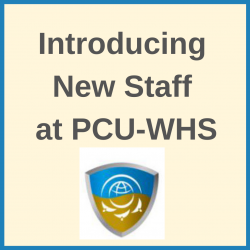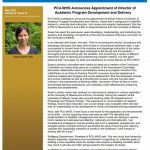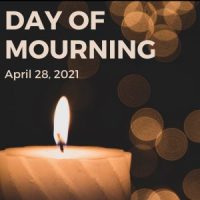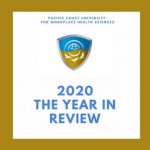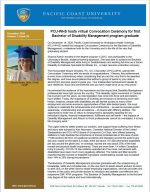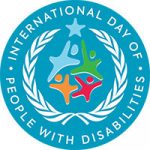
Application Deadline: June 15, 2023.
The Scholarship opportunity to enroll in the Bachelor of Disability Management (BDM) degree program is offered through the Pacific Coast University for Workplace Health Sciences (PCU-WHS). This is a critical gateway to a highly desirable and rewarding professional career opportunity in the rapidly expanding field of Return to Work and Disability Management not only in BC, but across Canada and internationally. Please see the website at: https://www.pcu-whs.ca/programs/bdm/
Applicants for the Scholarship in the BDM program must be BC residents who have completed a 2-year diploma or other relevant educational prerequisites, which provide 60 credits (or equivalent) in a range of disciplines but preferably human resources, business, occupational health and safety, nursing or social work from a recognized post-secondary educational institution. A combination of professional experience and career education may also be considered under the Flexible Admission policy on a case-by-case basis. Applicants under Flexible Admission should have a minimum of 5-10 years of relevant experience in a related field.
Scholarships are awarded on a first-come-first-qualified basis.
This limited Scholarship opportunity provides the following options:
- students can complete the BDM program in a two-year time frame as a full-time student (Scholarship applied to both years),
or
- participants can complete the BDM program in a four-year part-time format (Scholarship applied to first 2 years only)
commencing with the Fall trimester of 2023.
This Scholarship is designed to significantly increase the availability of disability management professionals and practitioners for British Columbia employers across all public and private sector organizations and be a major long-term strategic and sustainable workplace approach to “Building a Culture of Accommodation”. This strategy mirrors the successful outcomes seen in other jurisdictions across Canada and around the world where greater professionalization in the Return to Work and Disability Management field is significantly improving socio-economic outcomes for disabled workers, employers and society at large.
Individuals having completed the BDM will be encouraged to write the professional certification examinations for the designations of Certified Disability Management Professional (CDMP) and Certified Return to Work Coordinators (CRTWC).
To download the WDA Scholarship Information Booklet, please click on the following link: WDA Information Booklet 2023
To download an Application Form in order to apply for a Scholarship, please click the following link: WDA-Grant-Scholarship-Application-Form 2023
- The Scholarship program is made possible by funding to the National Institute of Disability Management and Research (NIDMAR), provided by the Government of Canada through the Canada-British Columbia Workforce Development Agreement (WDA).
- Candidates may apply for a Scholarship towards either full- or part-time study in the 2+2 Bachelor of Disability Management (BDM) program at Pacific Coast University for Workplace Health Sciences (PCU-WHS).
- Each successful candidate will be entitled to $6,500 annually for each of two years of full-time study, or $3,250 annually for the first 2 years only of four years of part-time study, applied towards tuition fees. The scholarship grant expires in 2027.
- Scholarship funds will cover most (but NOT all) of the annual course tuition per year, and can only be applied to tuition for the specialized courses required to complete the 2+2 BDM program.
- Candidates must:
-
- have completed at least 60 transferable academic credits from a recognized post-secondary institution (or equivalent; more information below).
OR
-
- qualify for Admission Directly into Year 3 (i.e., 2+2 BDM program) by Prior Learning Assessment and Recognition (PLAR) / Flexible Admission.
OR
- Hold a verifiable Red Seal Certification.
Eligible individuals may apply for a Scholarship for either full- or part-time study in the 2+2 Bachelor in Disability Management (BDM) program.
The WDA Grant Scholarship will provide
- $6,500 annually for each of 2 years of full-time study in the 2+2 BDM program, to cover most of the course tuition for the specialized courses required to complete the BDM degree. Applicants will be responsible for covering the balance of the tuition: approximately $1,120 per academic year for a student entering with 60 credits and with suitable research coursework. Textbooks, which are required by several courses, are not covered by the Scholarship.
- $3,250 annually for the first 2 years only of part-time study in the 2+2 BDM program, to cover most of the course tuition for the first 2 years of specialized courses required to complete the BDM degree. Applicants will be responsible for covering the balance of the tuition for the first 2 years: approximately $560 per academic year for a student entering with 60 credits and with suitable research coursework. Textbooks, which are required by several courses, are not covered by the scholarship. Applicants will be responsible for covering the full tuition and all other expenses for completion of the program (the final 2 years of part-time study), as the scholarship grant expires in 2027.
The WDA Grant Scholarship is open to candidates with landed immigrant or Canadian citizenship status who are permanent residents of British Columbia.
Successful candidates must:
- Meet the admission criteria of PCU-WHS.
In addition, successful candidates must qualify for Admission Directly into Year 3 of the BDM program (i.e., the 2+2 program). Your Scholarship would then apply to your 2+2 program (2 years for full-time study or the first 2 years only for part-time study). To qualify for Admission Directly into Year 3, applicants must:
- Have graduated with an associate degree, 2-year diploma, or other relevant educational prerequisite which provides 60 transferable academic credits (or equivalent) in a range of disciplines (preferred domains listed below).
- Current students must be attending a BC post-secondary institution.
- Students converting from an existing career path may have graduated from any university or college.
- Candidates with an average post-secondary GPA of 3.0 or higher will be preferred.
OR
- Be eligible for Admission Directly into Year 3 (i.e., the 2+2 program) on the basis of Prior Learning Assessment and Recognition (PLAR). A combination of professional experience and career education will be assessed under Flexible Admission policy on a case-by-case basis. Applicants under Flexible Admission should have a minimum of 5-10 years of relevant experience in a related field.
OR
- Hold a verifiable Red Seal Certification (Trades To Academic (TTA) admission into Year 3): Students holding a verifiable Red Seal Certification may be granted 57-60 transfer credits towards admission into the 2+2 BDM. Students granted transfer credit under Red Seal Certification will be required to enrol in WHDM 306 Applied Research unless they have achieved course equivalency. Pre-entry assessment of English command/Writing skills typically needed for success in BDM coursework will be required. Applicants are asked to apply under Admission Directly into Year 3.
Preferred domains of previous study include:
- Human Resources
- Occupational Health Safety
- Healthcare
- Business
- Social Work
- An application fee of $100 is required.
- The WDA Grant Scholarship will cover most of the tuition required to complete the 2+2 BDM program in 2 years of full-time study, or most of the tuition of the first 2 years only to complete the 2+2 BDM program in 4 years of part-time study. Students are responsible for covering the balance of tuition: approximately $1,120 per academic year for full-time study; or approximately $560 per academic year for the first 2 years of part-time study, and approximately $3,810 for the final 2 years of part-time study (as of December 2021), as the scholarship grant expires in 2027.
- The costs of elective or additional courses, if required, are not covered by the Scholarship.
- There will be other incidental costs, including costs of textbooks and other materials, which are not covered by the Scholarship.
- The cost of a Prior Learning Assessment and Recognition (PLAR) review for Flexible Admission ($400) is not covered by the Scholarship.
- The cost of a PLAR request for any specialized BDM course is not covered by the Scholarship.
- Fees for any course not completed within the Scholarship period will be the responsibility of the student.
- The percentage of actual tuition costs that the annual Scholarship will cover will be contingent on the number of transfer credits with which prospective students enter the degree program.
- Students who do not have suitable research coursework or experience may be required to take a 300-level research course prior to entering their final year of the program. This course (WHDM 306) is not covered by the Scholarship.
Please note that PCU-WHS is a statutory post-secondary teaching and research institution authorized by the Degree Quality Assessment Board to grant degrees, and has the BC EQA designation, which is renewed annually. However, because academic programs at PCU-WHS are offered exclusively online, they are not eligible for Canadian or Provincial Student Loans.
Financial support may be sought through WDA scholarships (for permanent BC residents – final intake September 2025).
The WDA Grant Scholarship will apply to:
- 2 years of full-time study in the 2+2 BDM program, commencing with the Fall 2025 trimester and terminating with the Spring 2027 trimester.
OR
- the first 2 years only of part-time study in the 2+2 BDM program, commencing with the Fall 2025 trimester and terminating with the Spring 2027 trimester. You can anticipate completion of the part-time program 2 years later (Spring 2029 trimester) without Scholarship funding, as the scholarship grant expires in 2027.
- Successful candidates are required to attend the PCU-WHS online 2+2 BDM program beginning in September 2025.
- You are also required to attend an online orientation to the program in advance of the first academic term.
- You must maintain an academic standing of 3.0 (B) or higher each trimester throughout your studies. If you fail to achieve this, you will be given the following trimester to restore your standing.
- You must be in a position to register in full- or part-time study in the 2+2 Bachelor of Disability Management (BDM) program beginning in September 2025, and to complete the degree within a 2-year period for full-time study or 4-year period for part-time study.
- To qualify for admission to the full-time WDA Grant Scholarship program, you must not be working full-time.
PCU-WHS is located in Port Alberni, British Columbia, but all BDM courses are offered exclusively online. Residents of British Columbia can study from their city or town of residence.
All courses at PCU-WHS are offered online by highly qualified faculty with a depth of multidisciplinary experience.
Students require a computer, an Internet connection (high-speed internet is recommended), and internet browser software to participate in the courses. Students should have a computer with a sound card and speakers to listen to course videos and audio, plus a microphone to participate in synchronous sessions. All courses require a word processing application such as Microsoft Word. Individual courses may have additional software requirements. Technical assistance is available for all courses.
The online platform provides you with:
- 24-hour access to course resources and materials.
- More opportunities to directly communicate with faculty.
- Constructive interaction with other students.
- Greater flexibility and convenience in managing your time. (Courses are not self-paced, however; timelines for course work are provided.)
- An environment to participate at a time and place best suited to your needs.
- Additional time to reflect before responding to discussions and other activities.
- An environment where the independent learner flourishes.
Students will have 24-hour access to most course resources, activities, and materials. The few synchronous activities (Zoom sessions, student presentations) will be scheduled in the Pacific time zone.
Full-time study in the 2+2 BDM program: For students who are not employed full-time:
- Completion of the BDM program in 2 years
- Completion of a minimum of ten (10) 3-credit courses per year (based on admission with 60 credits):
- Typically: 4 courses in the Fall trimester, 3 courses in the Winter trimester, 3 courses in the Spring trimester.
- The courses for the 2+2 BDM program are 12-week courses, with an anticipated time commitment of 8-9 hours per week per course, including approximately 4 hours on the required readings and 4 hours on either a discussion exercise or assignment. Expect to be enrolled in 3-4 courses per trimester.
Part-time study in the 2+2 BDM program: For students who are employed full-time:
- Completion of the BDM program in 4 years[1]
- Completion of a minimum of five (5) 3-credit courses per year (based on admission with 60 credits):
- Typically: 2 courses in the Fall trimester, 1-2 courses in the Winter trimester, 1-2 courses in the Spring trimester.
- The courses for the 2+2 BDM program are 12-week courses, with an anticipated time commitment of 8-9 hours per week per course, including approximately 4 hours on the required readings and 4 hours on either a discussion exercise or assignment. Expect to be enrolled in 1-2 courses per trimester.
| 2+2 BDM Program | ||
| Full-Time study | Part-Time study | |
| Time to completion of program | 2 years | 4 years [1] |
| Minimum number of courses per year | 10 | 5 |
| Duration of each course | 12 weeks | 12 weeks |
| Number of courses taken at one time | 3 or 4, depending on trimester | 1 or 2, depending on trimester |
| Time commitment per week per course | 8 hours | 8 hours |
[1] The WDA Scholarship can only be applied to the first 2 years of part-time study. Applicants will be responsible for covering the full tuition and all other expenses for the final 2 years of their program as the scholarship grant expires in 2027.
All expressions of interest and applications must be addressed to the Office of the Registrar at PCU-WHS (see contact information below).
DEADLINE: July 15, 2025
To apply, submit a WDA Grant Scholarship application package which includes:
- Completed WDA Grant-Scholarship Application Form 2025
- An application fee of $100
- Reflective essay
- Official transcripts issued from previous post-secondary institutions
- Letters of Attestation (2) for previous work experience
The WDA Scholarship can only be applied to the first 3 years of the 4-year part-time program. Applicants will be responsible for covering the full tuition and all other expenses of the final 1 year of the part-time program.
Applications packages must be addressed to the Office of the Registrar at PCU-WHS, and can be sent by email, Canada Post, or courier to:
WDA Grant Scholarship
Office of the Registrar
Pacific Coast University for Workplace Health Sciences
4755 Cherry Creek Road
Port Alberni, BC V9Y 0A7
[email protected]
Application packages must be received in their entirety no later than July 15, 2025.
Scholarships are awarded on a first-come-first-qualified basis.
Successful applicants will be notified by June 30, 2025.
Successful applicants must notify PCU-WHS that they have accepted the Scholarship by July 12, 2025. If the Scholarship is declined, it will be awarded to an individual on the waiting list, who will be notified of their success by July 19, 2025. Applicants who fail to respond to an offer of scholarship by the specified deadline will be considered to have declined the scholarship.
The WDA Grant Scholarship is designed to:
- Significantly increase availability of Disability Management Professionals for BC employers.
- Build enhanced recognition of the importance of effective Return to Work programs and the priority of maintaining employment for disabled workers.
- Reduce the unacceptable poverty rate of people with disabilities.
- Improve socio-economic outcomes for disabled workers, employers, and society at large through greater professionalization of those working in the Return to Work / Disability Management field.
- Approximately 80 percent of disabling conditions occur during an individual’s working life.
- Disability benefit recipients have less than a one percent chance of exiting the social security benefit system to enter into employment.
- This results in dependency and poverty for individuals with disabilities, unsustainable social protection costs, and increasing numbers of disability benefit recipients.
- About 25 percent of all Canadians living in poverty today ─ an estimated 1.4 million individuals ─ are people with disabilities.
- Effective Disability Management programs can make a crucial contribution to reducing poverty in Canada by promoting workplace health, preventing disabilities, and avoiding loss of employment due to a disabling condition.
Disability Management interventions are designed to:
- Reduce the likelihood that workers will acquire an impairment that could place their jobs at risk.
- Engage with workers with disabilities, before they have lost their attachment to their employer, to enhance the likelihood they will retain and return to their jobs.
- Reduce the number of workers exiting the active labour market and entering into the disability benefits system.
Early intervention is at the core of an effective Disability Management approach.
A key success factor in effective Disability Management programs is a consensus-based process based on collaboration between management and worker representatives, often enshrined in a collective agreement, and overseen by a joint management-labour committee.
Disability Management Professionals work internally within their own organizations or externally as providers to:
- Develop positive workplace health and job retention policies.
- Promote a positive and proactive workplace health and return to work organizational culture.
- Promote and protect the health and productivity of the workforce.
- Support workers with health conditions to remain at work.
- Assist workers absent on health grounds to safely return to the workplace.
Disability Management Professionals work collaboratively with management, unions or employee organizations, insurance providers, government agencies, health care providers, and others.
Disability Management Professionals work as human resource professionals, workplace health specialists, case managers, return to work coordinators, or in a variety of related areas.
Prospective places of employment for Disability Management Professionals include:
- Industrial work sites
- Corporate offices
- Insurance companies
- Service providers
- Human resources departments
- Workers’ compensation organizations
There is an opportunity for experienced professionals to establish their own businesses offering disability management contract services to local employers.
- Graduates of the BDM Program may go on to further studies and are recognized under the eligibility qualifications to write the professional certification examinations for the designations of:
-
- Certified Disability Management Professional – CDMP
- Certified Return to Work Coordinator – CRTWC
once they have met all of the following eligibility criteria:
-
- Successful completion of the Bachelor of Disability Management (BDM) degree
- Completed a minimum of 1 year performing the roles and responsibilities (during the last 5 years) with at least 50% or more of the time in the delivery of DM services, supervised by a qualified DM supervisor or management representative responsible for DM.
- The BDM is accepted by the Ted Rogers School of Management at Toronto Metropolitan University as a qualifying program for consideration of acceptance to its:
- Master of Business Administration
- Master of Science in Management
- Master of Health Administration
In a survey by the Canadian HR Reporter, it was found that 90 percent of business leaders say the value of professional designations is increasing.
For information regarding the WDA Grant Scholarship that is not addressed in the FAQs, please contact:
4755 Cherry Creek Road
Port Alberni, BC
Canada V9Y 0A7
Phone: 778-421-0824, ext. 209
Email: [email protected]
Due to high number of inquiries, there may be delays in receiving a response. We prioritize those who have submitted an application with associated application fees.
Funding provided by the Government of Canada through the Canada-British Columbia Workforce Development Agreement.


